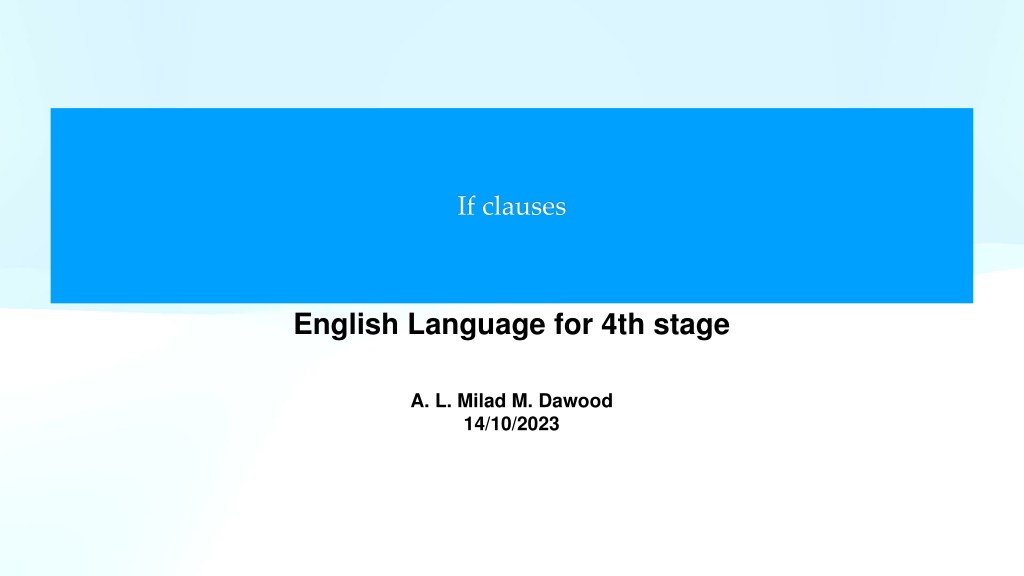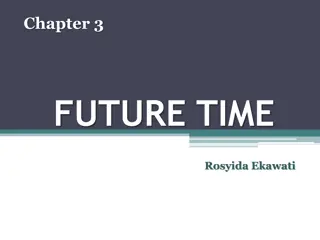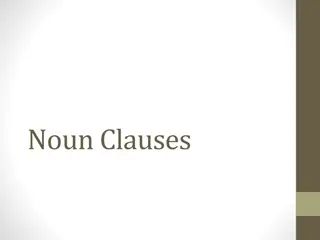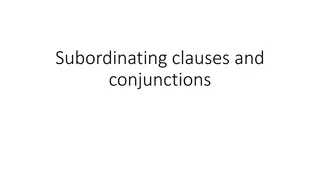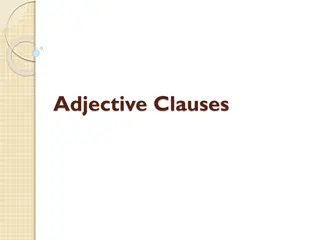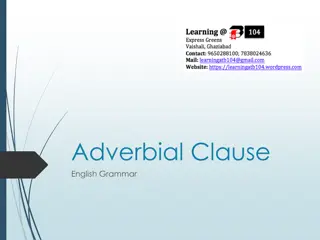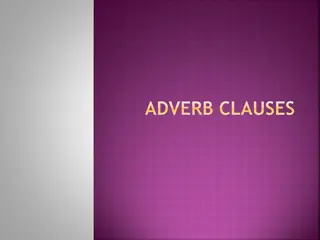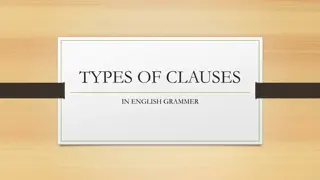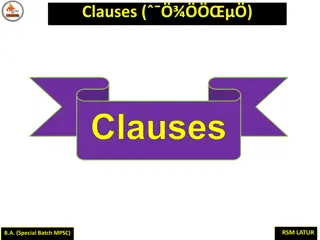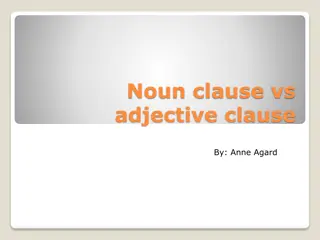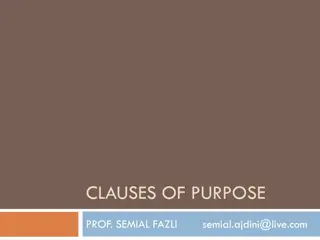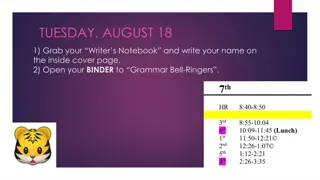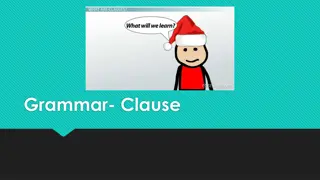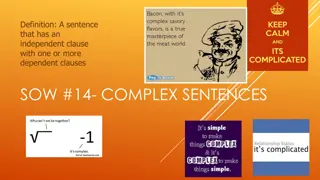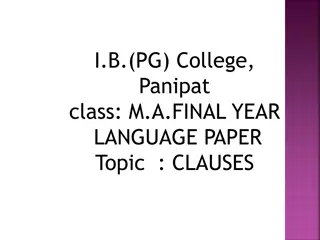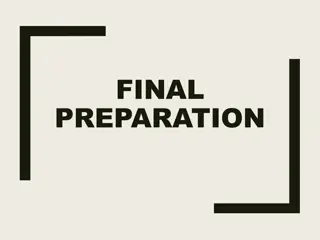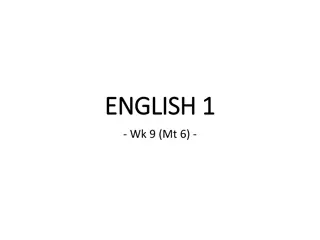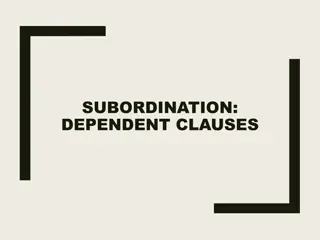Understanding If Clauses in English Grammar
If clauses are a vital aspect of English grammar, serving to express conditions that must be met for specific outcomes. They come in four types, including the zero conditional for facts, the second conditional for unlikely situations, and the third conditional for past hypothetical scenarios. While there are variations and exceptions, mastering these structures can enhance communication skills in English effectively.
Download Presentation

Please find below an Image/Link to download the presentation.
The content on the website is provided AS IS for your information and personal use only. It may not be sold, licensed, or shared on other websites without obtaining consent from the author. Download presentation by click this link. If you encounter any issues during the download, it is possible that the publisher has removed the file from their server.
E N D
Presentation Transcript
If clauses English Language for 4th stage A. L. Milad M. Dawood 14/10/2023
If clauses are an important part of English grammar, and they can be used to express a variety of ideas. These clauses are also known as conditional sentences because they express a condition that must be met for the result to occur. There are four different types of if clauses in English.
The first type is the zero conditional. This type of clause expresses a fact or situation that is always true. It uses the present tense in both the if clause and the main clause. For example, if you heat water to 100 degrees Celsius, it boils. In a laboratory setting, zero conditional sentences are often used to describe general scientific facts and principles. Here are some examples: 1. If you mix hydrogen and oxygen in a 2:1 ratio, you get water. 2. If you heat a liquid, it tends to expand. 3. If you expose certain chemicals to light, they may undergo a photochemical reaction. 4. If you increase the concentration of a solute, the solution's osmotic pressure also increases. 5. If you apply a force to an object, it accelerates in the direction of the force. 6. If you add an acid to a base, they neutralize each other, forming water and a salt. 7. If you cool a gas, it tends to condense into a liquid. 8. If you conduct an experiment under controlled conditions, you obtain reliable results. 9. If you introduce a catalyst, it speeds up the reaction rate without being consumed. 10. If you measure a liquid's temperature in Celsius, you can convert it to Fahrenheit using the formula. These sentences express general scientific principles and facts applicable to laboratory work.
The third type is the second conditional. This type of clause expresses an unlikely or hypothetical situation in the present or future. It uses the past tense in the if clause and "would" in the main clause. For example, "If I won the lottery, I would buy a new car." The fourth type is the third conditional. This type of clause expresses a hypothetical situation in the past that did not happen. It uses the past perfect tense in the if clause and "would have" in the main clause. For example, "If I had studied harder, I would have passed the exam." It's important to note that there are variations and exceptions to these rules, and the use of if clauses can depend on the context and intention of the speaker. However, mastering the basic structures of if clauses can greatly improve your ability to communicate effectively in English.
It's not necessarily a condition, it's just the relationship between two ideas. But now, we're going to see other situations, other sentences with if conditionals that are not like these. Sometimes you can mix tenses,
there's always exceptions to the rules. Today we're going to look at some of those exceptions. Okay? Let's see what happens. Okay, so now we're going to look at a few different types of mixtures, if you want to call it that, with the if clauses. But before I start to show you these examples, I want you to understand that these mixed conditionals are all about context.
You can generally understand what is going on, what the relationship between the two verbs are by looking at the context, looking at the time, looking at the place, looking at the situation that's going on.
If you didn't study computers in high school, you might find this course difficult. a simple past , a future How can you mix past and future? you have to realize is that this is a past situation that if you didn't complete something, if you didn't study computers, when you... You're starting a new course today, and this course is going to be very difficult for you because you don't have the previous knowledge. 8
If you didn't study computers in high school, you might find this course difficult. What advice would the author give to someone who didn't study computers in high school? a. Drop the course. b Study harder. c Get a tutor. d Realize that it will be difficult. What is the topic of the text? aThe difficulty of a computer course. bThe importance of studying computers in high school. cMixing past and future tenses. dThe benefits of taking a computer course.
If you didn't study computers in high school, you might find this course difficult. What is the reason why the course might be difficult for some students? a. they don't have the previous knowledge. b. The course is too advanced. c.The teacher is not good. d.They don't like computers. What is the main idea of the text? a. Studying computers is important. b. The course is going to be difficult. c. Mixing tenses is confusing. d. Previous knowledge is necessary for success.
So, this doesn't depend on this, this is a result of this. So, a past situation has a present result. Okay? So, one of the things you also need to think about mixed conditionals, a lot of it is a relationship between condition and result, as opposed to a condition and something happening depending on that condition.
If you didn't want to buy that shirt, you shouldn't have bought it. If you didn't want to ..(past tense) When we're talking about a specific situation, we're talking about the time that you bought this shirt, so it's a simple past because it's a definite past time, you should not have bought it ( it's a present perfect ) When we're using the present perfect, we're talking about the experience here, we're talking about a specific action happening in the past. Why did you buy it? Maybe somebody talked you into it. You didn't really want to, but you did. But you shouldn't have bought it. That should have been the experience that you had, but it wasn't. So again, it's not necessarily a condition here, it's just the relationship between two ideas. One doesn't depend on the other.
If you didn't want to buy that shirt, you shouldn't have bought it. What is the speaker's opinion about buying the shirt? a. It was a good decision. b. It was a bad decision. c. It doesn't matter. d. The text doesn't provide enough information. What is the speaker's message in the text? a. Don t buy things you don't want. b. Always buy things you like. c. Money is not important. d. Shopping is a waste of time. What is the speaker's tone in the text? a. Sarcastic b. Serious c. Angry d. Sad What is the subject of the text? a. Shopping b. Shirts c. Regret d. Money
if I had won the competition, I'd have a great job now. Meaning : If I had won the competition, so there was a competition in the past, I'm going to that situation. If I had won it, this is a past unreal because I didn't win it, then now I would have this job. But because this didn't happen, this is no longer a real situation. I didn't win the competition, so now I don't have a great job now, okay? So you got past, and you have hypothetical, and you have present time. So all these things are mixed, but again, it's all about context. But you have to understand, if I had won, but I didn't, I would have, but I don't,
if I had won the competition, I'd have a great job now. What is the meaning of the sentence? a. The speaker won the competition and has a great job now. b. The speaker did not win the competition and does not have a great job now. c. The speaker won the competition but does not have a great job now. d. The speaker did not participate in the competition. What is the meaning of 'if' in the sentence? a. A condition that is true. b. A condition that is false. c. A condition that is hypothetical. d. A condition that is certain.
if you will please follow me, I'll show you to your table. Or If you would please follow... If you would follow me, please, I'll show you to your table. This is not a conditional. This is just an expression, a very formal expression. You go to a restaurant, a very fancy restaurant, the host checks your name on the reservations. It's just a polite way to say please follow me. It's not a conditional. It means please come this way.
If it will help my case, I'll take the test The police arrested me and they said, we think you killed Mr. X and Mr. Y. I said, no, I didn't do it. And they said, well, I think we think you're lying. And my lawyer says, take the polygraph test, you know, like the test they put on you and if you're lying, the machine goes up and down like crazy. So I say, okay, you know what? If it will help my case, I will take the test. Meaning: If I can get this result, I will do this action. the relationship is not one of condition and not of dependency, result and action. Okay? But, if it helps, I'll take the test. Here we have the regular conditional. If it helps, this is what I will do to Or If I want... For this condition, I'll do this action.
1. Listen, Randy, if you really want that promotion, you ______ to put more effort into your work. A. have B. will have C. are going to have D. (all of these choices are acceptable) Present simple implies a fact (always true and for everyone). Future implies a real conditional (for Randy).
If it _____ a difference, then I'll take part. But I still have my doubts. A. made B. will make C. would make D. makes "If it makes a difference" is the conditional. He won't know the difference until after, so it is incorrect. If it will make a difference" is the result of him taking part.
"If Jim didn't have to take Sarah to the doctor, he would definitely go meet you." Will Jim go meet you? yes no He can't go because he has to take Sarah.
4. Oh my Goodness! My favorite numbers came up for the lottery this week. If I had bought a ticket, __________. A. I would be rich now. B. I am rich now C. I will be rich now D. I would have been rich now This is a hypothetical present situation, not an unreal past condition.
I hope everyone came prepared. If you didn't practice, this test ______ very difficult for you. is will be was had been
A: I just got off the phone with Mrs. Carter. We are meeting tomorrow. I really don't want to see her. B: Then why did you agree to the meeting if you ________ to see her? wouldn't have wanted didn't want don't want hadn't wanted This is a past action but a present feeling.
A: The Employee-of-the-Year awards are coming soon. Do you think the boss will nominate Larry? B: If Larry hadn't missed all those meetings last month, the boss ________ him on that nominations list. probably put will probably put would have probably put would probably put This is a hypothetical present situation.
If Tim had paid more attention to his business, he ________ it today. would still be running would have still been running would have still run will still be running
"Scott would have taken Samantha to the movies last night if she hadn't already seen all the movies that are playing now." Did Scott take Samantha to see a movie last night? Why? Yes, because Scott wanted to see all the movies playing now. No, because there were no new movies for Samantha to see. Yes, because Samantha wanted to see a movie playing now. No, because there were no new movies for Scott to see.
Emma: "How about going skiing this weekend?" James: "I would if I had the money." Will James go skiing this weekend? yes no If he had the money, he would go. But he doesn't have the money, so he can't go.
